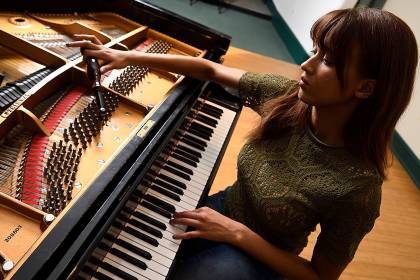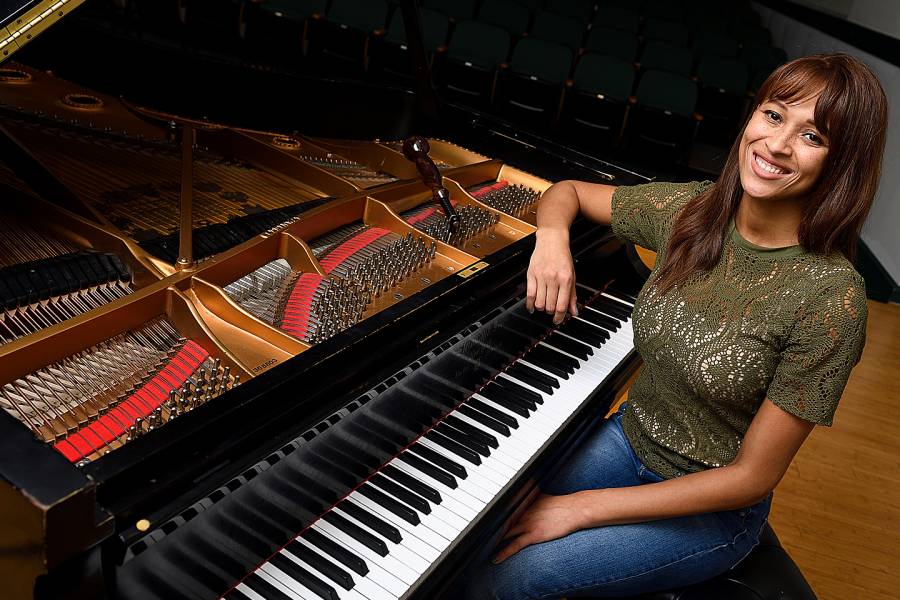Peabody Institute piano technician Renee Kelsey knew she was meant to work on the instrument the first time she saw a piano's action pulled out. This complex mechanism, through which a piano key causes a felt-tipped wooden hammer to strike a string, looks like a combination of an electronic circuit board and a weaving loom, with rows of knobs, screws, metal, wood, and moving parts. And everything that goes into making one key hit the right note, and every other key hit the right note, is called regulation.
The New Jersey native studied piano from the time she was 5 until high school, when she realized "if I try to do this for a living, I'm not good enough to make money at it." She earned an undergraduate degree in marine biology and then enrolled in the North Bennett Street School in Boston, the country's oldest trade school, which has an excellent program in piano technology. In 2017 she became one of the Peabody Institute's three piano technicians, who service 256 Peabody-owned pianos on and off campus. "It's an amazing instrument," Kelsey says. "At the end of the day, there's just nothing better than watching artists do what they do best because you did what you do best."
The Hub spoke with Kelsey in early March, prior to the university's shifting to remote learning because of the coronavirus pandemic, and updated the interview before publication in April.
What does one need to learn in order to be a piano technician? I mean, knowing how to repair and fix a piano is different from knowing how to play it, although they're both applications of the physics and mechanics of it.
I like that you said physics because tuning itself is the combination of math and physics, how the string works. I don't have perfect pitch, but I understand what the relationships between notes should sound like to get a good-sounding instrument at the end of the day. So there are many aspects that have to do with feeling and perception of sound. I'm fortunate that I played the piano and now I work with pianos because sometimes people will say, These keys feel squishy, and I have an idea of what that might be. Or, Its voicing is dull.
There are a lot of mechanical things going on in the piano. And working on pianos, there's a lot of regulation and making sure everything goes straight up and comes straight down. That is the ultimate goal, and it's kind of hard. We're working with wood and metal. They take in water, so [everything from] humidity to temperature matters. Another big part of it is the woodworking aspect, and knowing a lot about glue is important. You'll run into technicians who have their favorite wood glue.
With 256 pianos, is it a matter of doing scheduled maintenance on all of them, or do people report problems that they're having?
There are levels to that question. On the most basic level, our practice rooms have a QR code system that links in with our inventory so people can put in requests to alert us to problems. We have a small fleet of student workers that we train, and we have them go and check for broken strings, squeaky pedals, when the benches need to be repaired, other general problems—like when it's summer and it's really humid, all the notes might not play right. Things like that.
On the classroom level, the students check a lot of the things. We don't really have the time to spend hours and hours on every single piano and so we need to tune regularly and then focus on issues when they occur and try to figure that out.
For faculty studios, we see those pianos a lot. Part of it is that they get played frequently and need to stay nice or else we'll get complaints even faster. Our faculty here are absolutely wonderful and they understand that we're only three people dealing with a lot of pianos, but we still like to keep them happy. Now the concert halls, they get seen basically daily.
Really?
Yes. We really keep up the regulation, we replace parts as soon as it's necessary. With concert halls, between scheduling and people asking for different pianos in different places, you never know what's going to happen, so we try to stay prepared for anything.

Image caption: Kelsey adjusts a tuning pin on the “nameless” piano in the Cohen-Davidson Family Theatre.
Image credit: WILL KIRK / JOHNS HOPKINS UNIVERSITY
I imagine every piano manufacturer has its own set of standards. And I also imagine that, after working with certain pianos around the campus, you get to know their personalities a bit, all their idiosyncrasies.
Absolutely, and that's not even indicative of being in a university setting. That's just kind of what happens as a technician if you see the same piano all the time. We name our concert grands. Well, this [where she's sitting] is the only one that's not named because it's the only one in this space [the Cohen-Davidson Family Theatre]. But otherwise, it helps if they have names when we're talking about them. There are Sherman and Montana, and in Goodwin we have Mary Jane and Bette Davis, like the actress.
What determines the names?
Depends. Montana came from Montana.
Is Bette Davis a bit of a diva?
A little, yeah, she needs a lot of attention. Every piano around here definitely has its personality. And what technicians might like in pianos could be different from what players like in pianos. We have this old Bechstein that I personally love. There are these things in the piano called agraffes, French for staple. And they have 88 agraffes going all the way up, which just makes it so nice to tune. It just sounds really weak, so nobody likes to play it, but I love to tune it.
And every brand of piano has its own idiosyncrasies. We're not an all-Steinway school, but we do have a lot of them, and even within certain eras of Steinways there are different things happening. We can look at the serial number and know that given it is from this era, this set of issues is most likely to happen.
Is piano technology something that's steadily evolving? Materials have changed over the years, but the basic kind of idea of a piano hasn't changed in a very long time.
Oh, goodness—that's a broad topic. I'll just say one thing about that. I'm personally a little concerned about sourcing wood. The wood is not what it used to be. We can't get trees as tall or as wide as we used to, so there are certain sacrifices that are being made.
Does wood type change the action or sound?
A little bit. The soundboard is made of spruce, and it's multidirectional. So we need very, very long pieces and without any knots. So we're looking for very tall trees without a lot of branches to get these specific cuts. And it's hard. There are some companies that are making innovations, like Mason & Hamlin has carbon fiber action parts, so it's definitely trying something new. There are some good aspects of carbon fiber and some downfalls, too, but that's the same for anything.
What do you like about being a piano technician?
Tuning. It's like Sudoku for the ear in the way that you listen to certain things. You start tuning the piano using an octave essentially as a tester, and everything has to fit in that octave. In an ideal world, every note is the 12th root of two away from each other. If you think it's good enough and move on, that's fine. But then as you get farther and farther out from the middle, if you have mistakes, they get bigger and bigger and bigger until they're like, Oh my God, what did I do?
So it's careful work to figure out where everything goes, which you get to do in your head. You focus on it and make a really beautiful sound. When it's done well, all the sounds shimmer the same way.
On average, how long does that take—to do the piano Sudoku?
About an hour. It depends on what has to be done. If the piano is being up kept up, recently tuned and everything, it could be as little as 45 minutes, start to finish. If everything is just a little bit off, probably between an hour and an hour and a half.
Do you have a favorite part of the piano?
The piano as a whole is my favorite part. When I know I've done a good job and everything has come together—the tuning is good, the regulation is good, the voicing is even, the shift voicing is even, and I get to just listen to an artist use it for what it was intended—I mean, that's the whole point of my job, to facilitate creativity.
You keep saying regulation, and not to admit my ignorance, but what does that mean?
Oh—so on the keyboard we have 88 keys and [She picks up her purse, roots around a second, and starts pulling out tools] …
Do you walk around with tools in your bag?
Oh gosh, yes. If I can't fix a piano out of this purse, then we have to talk. Attached to all of the keys is a whole bunch of mechanisms. They need to function in a certain way, and they all need to function the same way from one to another or else the piano feels weird. That's regulation. The idea that everything is the same, all the mechanisms are doing the same thing at the same time. I'm just going to take the piano apart a little bit for you. [She starts removing pieces around the keyboard to expose the inside of the piano.]
As part of training, do you have to start with the piano completely dissembled and put it back together?
No, it's not that much of a puzzle. The first time I saw an action come out was the moment that really told me I was supposed to be doing this. This is the heart of the piano. And every one of these little screws, it doesn't matter how big or small it is, has an adjustment. And there are certain specs that we start with and then we refine them from there. Every piano requires something a little bit different to get it to quote unquote perfection.
And I imagine that as they age you have to respond to that.
Yes, there's a range in all the things that we regulate. However, at some point we reach the end of that range, and then the piano needs new parts. All of these hammers, they get a little bit flat on the top as they wear down and down, constantly getting played. Eventually, we can't make the rest of the regulation function around them because it's so far from what it originally was.
What happens to pianos that sit and don't get played for a while, like during the current situation?
If pianos are in relatively stable condition—both heat and humidity—then they will be OK for a time. However, with weather changes and temperature fluctuations, a variety of things could happen. Let's say the air isn't on in a building in the summertime, and we all know how humid Baltimore gets. The whole piano could seize up, and the notes won't play. Also, due to humidity, the soundboard will most likely swell and cause the piano to sharpen because the strings are tighter. Also, due to the higher standards we hold our concert grands to, they will require double the amount of work to get them back. More tuning, more regulation, and much more voicing.
What other aspects of your job are you having to think about and tend to during all of this?
The inventory and our student rental program—we have pieces of both that are not electronic yet. This has made it interesting to speak with my colleagues and answer certain questions. Thus, what better time is there to make sure everything is accessible online, from contracts to piano moves? We're working toward that goal daily.
The biggest concern when things get back to normal, whatever that will look like, is getting the inventory back up to our standards. We don't know what we'll get—everything could be OK and just need tuning—but we won't know until we get back to it. I, for one, am looking forward to that day.
Posted in News+Info
Tagged who does that?









